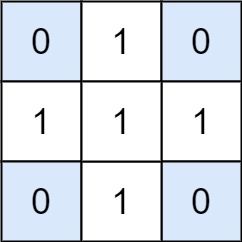Welcome to Subscribe On Youtube
1074. Number of Submatrices That Sum to Target
Description
Given a matrix and a target, return the number of non-empty submatrices that sum to target.
A submatrix x1, y1, x2, y2 is the set of all cells matrix[x][y] with x1 <= x <= x2 and y1 <= y <= y2.
Two submatrices (x1, y1, x2, y2) and (x1', y1', x2', y2') are different if they have some coordinate that is different: for example, if x1 != x1'.
Example 1:

Input: matrix = [[0,1,0],[1,1,1],[0,1,0]], target = 0 Output: 4 Explanation: The four 1x1 submatrices that only contain 0.
Example 2:
Input: matrix = [[1,-1],[-1,1]], target = 0 Output: 5 Explanation: The two 1x2 submatrices, plus the two 2x1 submatrices, plus the 2x2 submatrix.
Example 3:
Input: matrix = [[904]], target = 0 Output: 0
Constraints:
1 <= matrix.length <= 1001 <= matrix[0].length <= 100-1000 <= matrix[i] <= 1000-10^8 <= target <= 10^8
Solutions
-
class Solution { public int numSubmatrixSumTarget(int[][] matrix, int target) { int m = matrix.length, n = matrix[0].length; int ans = 0; for (int i = 0; i < m; ++i) { int[] col = new int[n]; for (int j = i; j < m; ++j) { for (int k = 0; k < n; ++k) { col[k] += matrix[j][k]; } ans += f(col, target); } } return ans; } private int f(int[] nums, int target) { Map<Integer, Integer> d = new HashMap<>(); d.put(0, 1); int s = 0, cnt = 0; for (int x : nums) { s += x; cnt += d.getOrDefault(s - target, 0); d.merge(s, 1, Integer::sum); } return cnt; } } -
class Solution { public: int numSubmatrixSumTarget(vector<vector<int>>& matrix, int target) { int m = matrix.size(), n = matrix[0].size(); int ans = 0; for (int i = 0; i < m; ++i) { vector<int> col(n); for (int j = i; j < m; ++j) { for (int k = 0; k < n; ++k) { col[k] += matrix[j][k]; } ans += f(col, target); } } return ans; } int f(vector<int>& nums, int target) { unordered_map<int, int> d{ {0, 1} }; int cnt = 0, s = 0; for (int& x : nums) { s += x; if (d.count(s - target)) { cnt += d[s - target]; } ++d[s]; } return cnt; } }; -
class Solution: def numSubmatrixSumTarget(self, matrix: List[List[int]], target: int) -> int: def f(nums: List[int]) -> int: d = defaultdict(int) d[0] = 1 cnt = s = 0 for x in nums: s += x cnt += d[s - target] d[s] += 1 return cnt m, n = len(matrix), len(matrix[0]) ans = 0 for i in range(m): col = [0] * n for j in range(i, m): for k in range(n): col[k] += matrix[j][k] ans += f(col) return ans -
func numSubmatrixSumTarget(matrix [][]int, target int) (ans int) { m, n := len(matrix), len(matrix[0]) for i := 0; i < m; i++ { col := make([]int, n) for j := i; j < m; j++ { for k := 0; k < n; k++ { col[k] += matrix[j][k] } ans += f(col, target) } } return } func f(nums []int, target int) (cnt int) { d := map[int]int{0: 1} s := 0 for _, x := range nums { s += x if v, ok := d[s-target]; ok { cnt += v } d[s]++ } return } -
function numSubmatrixSumTarget(matrix: number[][], target: number): number { const m = matrix.length; const n = matrix[0].length; let ans = 0; for (let i = 0; i < m; ++i) { const col: number[] = new Array(n).fill(0); for (let j = i; j < m; ++j) { for (let k = 0; k < n; ++k) { col[k] += matrix[j][k]; } ans += f(col, target); } } return ans; } function f(nums: number[], target: number): number { const d: Map<number, number> = new Map(); d.set(0, 1); let cnt = 0; let s = 0; for (const x of nums) { s += x; if (d.has(s - target)) { cnt += d.get(s - target)!; } d.set(s, (d.get(s) || 0) + 1); } return cnt; }